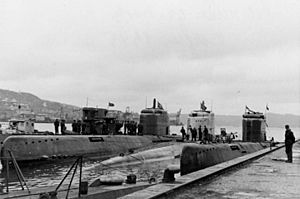German submarine U-2511 facts for kids
class="infobox " style="float: right; clear: right; width: 315px; border-spacing: 2px; text-align: left; font-size: 90%;"
| colspan="2" style="text-align: center; font-size: 90%; line-height: 1.5em;" | 
|} The German submarine U-2511was a special type of submarine used by Nazi Germany during World War II. It was a Type XXI submarine, also known as an Elektroboot(meaning "electric boat"). This submarine was built at the Blohm & Voss shipyard in Hamburg. It was started on 7 July 1944, launched on 2 September 1944, and officially joined the navy on 29 September 1944. Its commander was Adalbert Schnee.
Contents
| History | |
|---|---|
| Name | U-2511 |
| Ordered | 6 November 1943 |
| Builder | Blohm & Voss, Hamburg |
| Yard number | 2511 |
| Laid down | 7 July 1944 |
| Launched | 2 September 1944 |
| Commissioned | 29 September 1944 |
| Fate |
|
| General characteristics | |
| Class and type | Type XXI submarine |
| Displacement |
|
| Length | 76.70 m (251 ft 8 in) (o/a) |
| Beam | 8 m (26 ft 3 in) |
| Height | 11.30 m (37 ft 1 in) |
| Draught | 6.32 m (20 ft 9 in) |
| Propulsion |
|
| Speed |
|
| Range |
|
| Test depth | 240 m (790 ft) |
| Complement | 5 officers, 52 enlisted |
| Sensors and processing systems |
|
| Armament | |
| Service record | |
| Part of: |
|
| Commanders: |
|
| Operations: |
|
| Victories: | None |
Submarine Design and Features
The U-2511 was a large submarine for its time. When it was on the surface, it weighed about 1,621 tons. When it was underwater, it weighed even more, around 1,819 tons. The submarine was about 76.70 m (251 ft 8 in) long, which is longer than two basketball courts! It was 8 m (26 ft 3 in) wide and 6.32 m (20 ft 9 in) deep in the water.
How it Moved
This submarine used both diesel engines and electric motors to move. It had two powerful diesel engines and two main electric motors. It also had two special electric motors for "silent running." These allowed the submarine to move very quietly underwater, making it harder for enemies to detect.
- When on the surface*, the U-2511 could travel at about 15.6 knots (28.9 km/h; 18.0 mph) using its diesel engines.
- When underwater*, it could go as fast as 17.2 knots (31.9 km/h; 19.8 mph) with its main electric motors.
- For quiet movement*, it could cruise at 6.1 knots (11.3 km/h; 7.0 mph).
The submarine could travel a long way without needing to refuel. It could go about 15,500 nmi (28,700 km; 17,800 mi) on the surface at a speed of 10 knots (19 km/h; 12 mph). Underwater, it could travel 340 nmi (630 km; 390 mi) at 5 knots (9.3 km/h; 5.8 mph). It could also dive very deep, down to 240 m (790 ft).
Weapons and Crew
The U-2511 was well-armed. It had six torpedo tubes at the front. It could carry 23 torpedoes, or a mix of 17 torpedoes and 12 naval mines. For defense against airplanes, it had four 2 cm (0.79 in) anti-aircraft guns. The submarine needed a crew of 57 people to operate it: five officers and 52 sailors.
Service History
After its training, the U-2511 joined the 11th U-boat Flotilla in Bergen, Norway, on 15 March 1945. This was its first time being ready for real combat.
First and Only Patrol
The U-2511 went on only one patrol. It left Bergen, Norway, on 30 April 1945. This was the same day that Adolf Hitler died. The submarine was heading towards the Caribbean Sea. However, on 4 May, its commander, Adalbert Schnee, received an order to stop fighting because the war was ending.
Commander Schnee later said that on 4 May, his submarine had a British cruiser in its sights. He claimed that he performed a practice attack on the cruiser before leaving the area without being noticed. This happened just as he got the news that the war was over.
What Happened to U-2511?
On 17 June 1945, the U-2511 was moved from Bergen to Londonderry Port. This was part of an operation called Operation Deadlight. During this operation, many German U-boats were sunk by the Allied forces.
The U-2511 was sunk on 7 January 1946, at 7:40 pm. It was sunk by gunfire after the cable towing it broke. The wreck of the U-2511 now lies at a depth of 69 metres (226 ft). Divers have visited the wreck several times, finding it mostly intact except for a large hole caused by the shellfire that sank it.
 | May Edward Chinn |
 | Rebecca Cole |
 | Alexa Canady |
 | Dorothy Lavinia Brown |

